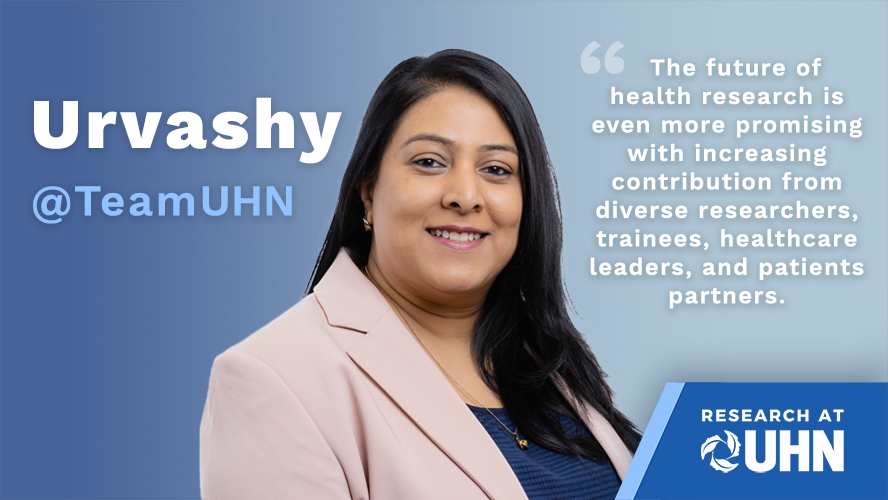
Tell us about your role at UHN.
I am currently a postdoctoral researcher at UHN’s KITE Research Institute (KITE). My two research projects focus on upper limb rehabilitation using novel robotic training and neuromodulation modalities after stroke and spinal cord injury.
I am also a member of the UHN Research IDEA Curriculum Advisory Sub-Committee. As a woman from a minority background, this has been a great opportunity for me to share my experience working in diverse healthcare systems. I am particularly interested in helping trainees integrate IDEA principles into their work and understand how to navigate working in diverse clinical and research environments. Given the diversity of the Canadian population, researchers need to understand how to effectively address gaps in health care and meet the needs of our patients.
How long have you been at UHN and what led you to this role?
I have been at UHN for 3 years. I am originally from the Republic of Mauritius where I studied to become a physiotherapist. I have an MSc in Physiotherapy-Neurorehabilitation from the University of Nottingham, United Kingdom, and a PhD in Physiotherapy from the University of Newcastle, Australia. I previously was also faculty at the University of Mauritius for 7 years leading the physiotherapy education program. In 2021, I immigrated to Canada to fulfill my research career aspirations and challenge myself to do a postdoctoral fellowship.
What are you passionate about in your role at UHN? What does health research mean to you?
As a postdoctoral researcher at UHN, I am passionate about developing new neurorehabilitation technologies for people with stroke and spinal cord injury. I enjoy the opportunity to work with advanced robotics and neuromodulation modalities that could be pivotal in optimizing recovery for neurological patients. I also enjoy engaging in stimulating scientific discussions with other researchers and trainees. As a clinician and researcher, I find that pursuing a career in health research can be quite challenging; however, working with a great team helps maintain resilience.
I believe that health research is the driving force behind optimal care for our patients and should be prioritized. As health research goes hand-in-hand with healthcare delivery, more effort should be concentrated on overcoming obstacles in translating research into clinical practice.
How does your work help to advance UHN's vision of A Healthier World?
My mission is to develop rehabilitation approaches to help restore movement for people with neurological conditions and improve their quality of life. My research program specifically focuses on developing complex neurorehabilitation approaches using clinical restorative therapy and advanced rehabilitation technology like robotic training, haptic training using pressure sensors, and neuromodulation.
My research addresses a unique area of research designed to advance our understanding of the complex interactions between sensory function, motor function, and cognitive processes necessary for upper limb function. I am particularly interested in studying young and older stroke survivors to better understand the effects of age on upper limb recovery after stroke. I am also interested in studying people who have reintegrated into the community to understand how we can meet their rehabilitation needs in the long-term.
What makes UHN an ideal place to advance health research?
I feel privileged to conduct my post-doctoral research at KITE and the Toronto Rehabilitation Institute (Toronto Rehab), one of the world’s top-ranked rehabilitation research institutes. I have developed an extensive network of multidisciplinary collaborators to advance my research program beyond traditional rehabilitation to integrate several aspects of biomedical engineering such as artificial intelligence and advanced robotics. I have also met many scientists who have mentored me in various academic pursuits.
Additionally, Toronto Rehab has connections with several research platforms which allows for unique opportunities to connect with leading researchers from across Canada. There is a lot of support provided within the UHN network that makes UHN an excellent environment for researchers to advance health research.
Do you have any interests outside of work?
I have enjoyed learning Kathak, which is an Indian form of classical dance, for 9 years and have a degree in Kathak dance. I occasionally practice Kathak whenever I feel inspired. But my main hobby is reading books or listening to podcasts about self-development and personal growth. I also enjoy travelling both locally and abroad, exploring nature like trails and snorkeling.
What do you see for the future of health research, and what gets you excited about it?
I think the future of health research lies in integrating advanced technologies such as artificial intelligence, big data, and innovative technological devices. This will help us provide more personalized medicine and rehabilitation for our patients.
The future of health research is even more promising with increasing contributions from diverse researchers, trainees, healthcare leaders, and patient partners. As an immigrant, it is an exciting opportunity for me to be part of this process in Canada. I am excited about collaborating with local and international collaborators to advance the field of physiotherapy and neurorehabilitation. I am also enthusiastic about trialing new rehabilitation technologies that have the potential to revolutionize rehabilitation and impact the lives of patients.
How to Participate in You @TeamUHN
You @TeamUHN is a campaign to highlight the important scientific contributions that research lab staff, trainees and learners, administrative staff, core facilities staff, Research Solutions & Services staff, and volunteers make towards A Healthier World through discovery and innovation. If you’re interested in sharing your story, we invite you to complete this form here (open to UHN staff, trainees and volunteers).




